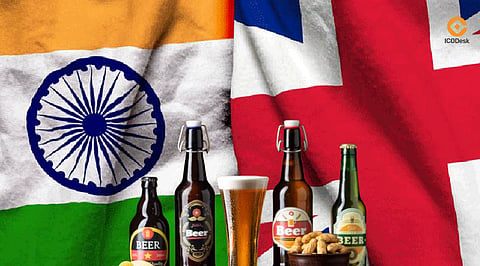

As a decision weighing domestic sensitivities and ongoing negotiations with the European Union on trade, India has chosen not to include British wines in any relief on import duties under the recently signed Free Trade Agreement (FTA) with the United Kingdom. Although some token relief has been granted to UK beer, several other sensitive farm products have also been left off the tariff-cut list.
A government source, who was not willing to be named, agreed with the details, adding, "Wine is excluded from the list, along with a number of other farm products in the trade agreement. We are also granting only a partial concession of duty on British beer." The excluded agricultural products are said to include apples, dairy, cheese, oats, and edible oils.
The exclusion of British wines from the FTA's benefit basket is viewed as a strategic one. India is currently negotiating further sophisticated FTAs with the European Union, which is the world's largest player in the wine market.
Granting significant reductions in duty on wines to the UK could have potentially resulted in the EU also making similar demands, placing the current negotiations in a sensitive position. By keeping present import tariffs on wine, India seeks to refrain from establishing a precedent that can undermine its negotiating leverage with the EU.
The FTA, which was revealed on May 6th after long negotiations, does provide cuts in tariffs on other major British exports like Scotch whisky and vehicles. According to the deal, India will phase down the import tax on UK whisky and gin from the existing high of 150% to 75% with immediate effect and then to 40% within a period of ten years.
This tariff concession on spirits is likely to bring down the cost of British spirits for Indian consumers. Duties on cars will also be reduced in phases. On the other hand, the FTA provides duty reductions on various Indian exports to the UK, including garments and leather goods, with the purpose of enhancing India's manufacturing and export industries.
To allay the possible fears of Indian whisky producers, the government spokesperson explained that a phased reduction in duty on Scotch whisky is not likely to cause much of a dent in the Indian market, particularly considering the comparatively low volume of Scotch imports as compared to total domestic demand.
Although the trade pact has been agreed upon at the negotiating stage, it still remains some way from being put into practice. Both nations are now conducting a legal scrubbing, also known as "legal scrubbing," of the negotiated text.
After that, the FTA will have to be signed formally and then ratified by the UK Parliament, which may take up to one year. Officials project that the FTA may enter into force only by late 2025 or early 2026.
The limited concession granted on British beer implies a more subtle strategy than the total exclusion of wines. The precise nature and level of the relief on beer, however, was not specified at first glance. It may be because there is less challenge to the domestic brewery market or that there is a calculated move to provide some token advantage to the UK in the liquor market.
Exclusion of wine and limited relief on beer are indicative of the fine balancing act that India is engaged in under its trade negotiations, seeking beneficial terms while safeguarding domestic industries and juggling intricate geopolitics with other key trading nations. The months ahead will be critical as the legal machinations play out and the full ramifications of the India-UK FTA become evident.